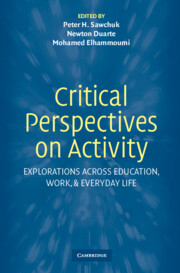Book contents
- Frontmatter
- Contents
- List of Contributors
- Foreword by Seth Chaiklin
- Acknowledgements
- 1 Introduction: Exploring Activity Across Education, Work, and Everyday Life
- SECTION I CRITICAL PERSPECTIVES ON THEORY
- SECTION II EDUCATION
- SECTION III WORK
- SECTION IV EVERYDAY LIFE
- 11 Education as Mediation Between the Individual's Everyday Life and the Historical Construction of Society and Culture by Humankind
- 12 Activity and Power: Everyday Life and Development of Working-Class Groups
- References
- Index
12 - Activity and Power: Everyday Life and Development of Working-Class Groups
Published online by Cambridge University Press: 10 December 2009
- Frontmatter
- Contents
- List of Contributors
- Foreword by Seth Chaiklin
- Acknowledgements
- 1 Introduction: Exploring Activity Across Education, Work, and Everyday Life
- SECTION I CRITICAL PERSPECTIVES ON THEORY
- SECTION II EDUCATION
- SECTION III WORK
- SECTION IV EVERYDAY LIFE
- 11 Education as Mediation Between the Individual's Everyday Life and the Historical Construction of Society and Culture by Humankind
- 12 Activity and Power: Everyday Life and Development of Working-Class Groups
- References
- Index
Summary
What is abstracted in orthodox sociology as ‘socialization’ is in practice, in any actual society, a specific kind of incorporation. Its description as ‘socialization’, the universal abstract process on which all human beings can be said to depend, is a way of avoiding or hiding this specific content and intention. Any process of socialization of course includes things that all human beings have to learn, but any specific process ties this necessary learning to a selected range of meanings, values, and practices which, in the very closeness of their association with necessary learning, constitute the real foundations of the hegemonic … Specific communities and specific places of work, exerting powerful and immediate pressures on the conditions of living and of making a living, teach, confirm, and in most cases finally enforce selected meanings, values and activities.
(Williams 1977: 117–118)INTRODUCTION
Certainly, human learning as a process of socialization constitutes a foundational element of the hegemony of advanced capitalism. In many ways, the concept of learning speaks to those core relations that have informed and continue to inform the sociological enterprise: agency/structure, micro/macro, change/order. However, understanding learning as a generalized ‘socialization’ process is deeply problematic: It is inherently normative, often unknowingly so; it is ahistorical; it presumes the form of relation between individuals and society; in short, it obscures more than it reveals.
- Type
- Chapter
- Information
- Critical Perspectives on ActivityExplorations Across Education, Work, and Everyday Life, pp. 238 - 268Publisher: Cambridge University PressPrint publication year: 2006
- 5
- Cited by

